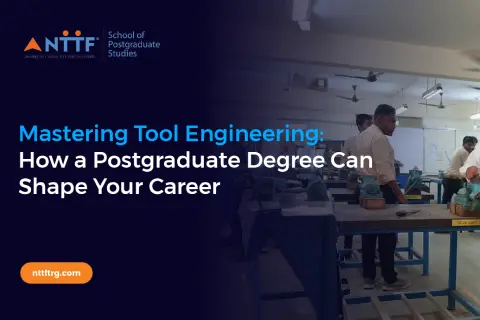Mastering Tool Engineering: How a Postgraduate Degree Can Shape Your Career
December 23, 2024 2024-12-28 5:22Mastering Tool Engineering: How a Postgraduate Degree Can Shape Your Career
The manufacturing industry is constantly evolving, demanding skilled professionals with specialized knowledge. B.E. and B.Tech graduates can advance their careers and gain a competitive edge with a Postgraduate degree in tool engineering. This specialized education provides the advanced skills and expertise needed to excel in this dynamic field.
Tool engineers are the masterminds behind the scenes, the architects of modern manufacturing, the problem-solvers who design and develop the tools, machines, and processes that shape our world. From the sleek smartphone in your hand to the powerful aircraft soaring through the skies, tool engineers are the driving force behind manufacturing marvels.
But here’s the insider tip: In today’s technology-driven world, a bachelor’s degree that is B.E and B.Tech alone might not be enough to unlock your full potential. To truly excel and become a leader in your field, you need to level up with a postgraduate degree in tool engineering.If you dream of making an impact in this field, NTTF’s Postgraduate Diploma in Tool Engineering (PGTE – CP 06) is your pathway to success.
Think of it as your golden ticket to a world of opportunities, equipping you with the advanced knowledge, specialized skills, and industry connections to conquer the challenges and seize the opportunities that lie ahead.
Why a Postgraduate Degree?
Imagine this: You’re not just learning the fundamentals of engineering; you’re diving deep into the intricacies of advanced tool design, mastering the art of materials selection, and harnessing the power of cutting-edge software to simulate and optimize manufacturing processes. You’re not just an engineer; you’re a specialist, a problem-solver, an innovator.
Here’s how a postgraduate degree can catapult your career to new heights:
- Become an Industry Expert: Delve into fascinating areas like:
- Advanced Tool Design: Master the art of creating complex tools, dies, molds, and fixtures for diverse manufacturing processes, from injection molding and die casting to stamping and forging.
- Materials Science and Engineering: Unravel the secrets of materials, their properties, and how to select the perfect ones for any application, ensuring durability, performance, and cost-effectiveness.
- Computer-Aided Engineering (CAE): Wield powerful software like CAD/CAM to design, simulate, and analyze tooling systems with precision, optimizing designs and troubleshooting potential issues before they arise.
- Advanced Manufacturing Processes: Explore the frontiers of 3D printing, automation, robotics, and other cutting-edge technologies that are revolutionizing the manufacturing landscape.
- Industry 4.0 Technologies: Become fluent in the language of the future, where data analytics, artificial intelligence, and the Internet of Things are transforming manufacturing, enabling smart factories, predictive maintenance, and optimized production.
- Unlock Elite Career Opportunities: A postgraduate degree elevates your profile, opening doors to coveted roles like:
- Senior Tool Design Engineer: Lead the design and development of complex tooling systems for critical manufacturing processes, ensuring precision, efficiency, and innovation.
- Manufacturing Process Engineer: Optimize production lines to enhance efficiency, reduce costs, and elevate product quality, driving continuous improvement and maximizing productivity.
- Research and Development Engineer: Push the boundaries of tool engineering by researching new materials, processes, and technologies, contributing to the advancement of the field and shaping the future of manufacturing.
- Technical Specialist: Provide expert guidance on tooling and manufacturing processes to production teams, acting as a valuable resource and driving best practices.
- Project Manager: Take charge of complex projects, overseeing budgets, timelines, and resources, ensuring successful execution and delivering exceptional results.
- Future-Proof Your Skills: The knowledge and skills you gain in a postgraduate program are like superpowers that will serve you well throughout your career, regardless of technological advancements and industry shifts. You’ll be prepared to thrive in the era of Industry 4.0 and beyond.
- Boost Your Earning Potential: Let’s face it, a good salary is a major perk. A postgraduate degree gives you a competitive edge in the job market, allowing you to negotiate a higher starting salary and accelerate your career progression, securing a financially rewarding future.
- Unleash Your Inner Innovator: Postgraduate studies nurture your critical thinking abilities, challenge you to solve complex problems, and empower you to push the boundaries of what’s possible. You could be the one inventing the next groundbreaking manufacturing technology that revolutionizes the industry.
Why Choose NTTF as Your Training Ground?
Now that you’re fired up about postgraduate studies, let’s talk about where to embark on this exciting journey. NTTF (Nettur Technical Training Foundation) is a renowned institution in India, celebrated for its hands-on, industry-focused approach to education, producing highly skilled and sought-after graduates.
Here’s what makes NTTF the perfect launchpad for your tool engineering career:
- Learn from the Masters: NTTF boasts a team of experienced faculty members who are not just academics but also industry veterans. They’ll be your mentors, sharing their real-world insights, practical knowledge, and industry best practices, guiding you towards success.
- Immerse Yourself in Practical Experience: NTTF’s state-of-the-art labs and workshops are your playground for innovation. You’ll get to apply your knowledge, experiment with the latest technologies, and hone your skills in a real-world setting, gaining hands-on experience that employers value.
- Tap into Powerful Industry Connections: NTTF has forged strong partnerships with leading manufacturing companies, providing you with invaluable opportunities for internships, industry visits, and potential job placements, giving you a head start in your career.
- Focus on Real-World Skills: NTTF’s curriculum is meticulously crafted to equip you with the practical skills that employers crave. You’ll graduate not just with theoretical knowledge but with the hands-on expertise to make an immediate impact in the workplace, contributing to your team from day one.
What Programs Does NTTF Offer?
NTTF offers two fantastic pathways for aspiring tool engineers:
- Postgraduate Degree in Tool Engineering (PGTE CP06): This comprehensive program provides a deep dive into advanced tool design, manufacturing processes, materials science, and Industry 4.0 technologies, preparing you for a wide range of leadership roles in the manufacturing industry.
- Diploma in Tool Engineering(CP 01): This focused diploma program offers an intensive learning experience, equipping you with specialized skills in a shorter timeframe, ideal for those seeking a fast track to industry-specific expertise.
NTTF’s Postgraduate Degree in Tool Engineering (CP 06): Shaping the Future of Tool Engineers
The PG Degree in Tool Engineering (PGTE – CP 06) is a two-year, specialized course designed for engineering graduates and diploma holders aiming to excel in this critical domain. The program blends advanced theoretical knowledge with practical, hands-on training, preparing students for leadership roles in the global manufacturing landscape.
Key Highlights:
- Focus on advanced tool design and emerging technologies like Industry 4.0.
- Hands-on training with state-of-the-art tools and software.
- Strong emphasis on real-world applications and industry-relevant skills.
- Access to a robust network of industry partners for internships and placements.
Both programs are designed to lay a strong foundation for your tool engineering career and propel you towards success, providing you with the knowledge, skills, and connections to thrive in this dynamic field.
What Will You Learn?
Prepare to be amazed by the exciting subjects you’ll explore:
- Advanced Tool Design: Become a master craftsman of complex tools, dies, molds, and fixtures, essential for various manufacturing processes, ensuring precision, efficiency, and innovation in product development.
- Materials Science and Engineering: Unlock the mysteries of materials, their properties, and how to choose the right ones for specific applications, considering factors like strength, durability, and cost-effectiveness to optimize tool performance.
- Computer-Aided Engineering (CAE): Harness the power of CAD/CAM software to design, simulate, and analyze tooling systems with precision, identifying potential issues and optimizing designs before production, saving time and resources.
- Advanced Manufacturing Processes: Journey to the cutting edge of 3D printing, automation, robotics, and other transformative technologies that are shaping the future of manufacturing, enabling you to contribute to the development and implementation of innovative solutions.
- Industry 4.0 Technologies: Become fluent in the language of the future, where data analytics, artificial intelligence, and the Internet of Things are revolutionizing manufacturing, enabling smart factories, predictive maintenance, and optimized production, preparing you for the challenges and opportunities of the digital age.
What Career Paths Await You?
With a postgraduate degree or PG diploma in tool engineering from NTTF, a world of exciting career opportunities awaits:
- Tool Design Engineer: Craft innovative tools for diverse manufacturing processes, shaping the products of tomorrow, from consumer goods to aerospace components, contributing to the advancement of various industries.
- Manufacturing Engineer: Fine-tune production lines to maximize efficiency, minimize costs, and ensure top-notch product quality, playing a crucial role in optimizing manufacturing operations and driving profitability.
- Quality Control Engineer: Become the guardian of precision, ensuring that manufactured components meet the highest quality standards, safeguarding the reputation of your company and ensuring customer satisfaction.
- Research and Development Engineer: Push the boundaries of tool engineering through research and innovation, developing groundbreaking technologies, materials, and processes that revolutionize the industry and drive progress.
- Project Manager: Lead and manage complex tool engineering projects, orchestrating teams and resources to achieve ambitious goals, ensuring successful execution, on-time delivery, and exceeding expectations.
Ready to Take the Leap?
A postgraduate degree in tool engineering is your passport to a fulfilling and future-proof career. It’s your chance to be at the forefront of innovation, solve real-world challenges, and leave your mark on the world, contributing to the advancement of technology and shaping the future of manufacturing.Don’t wait! Visit the NTTF website or contact their admissions team today to learn more about their postgraduate programs and how they can empower you to forge your future and become a leader in the exciting world of tool engineering.








